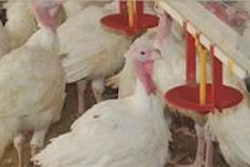The World Bank predicts that China's growth will slow this year to just 6.5 percent – compared to double-digit growth for much of the past decade. By comparison, the global economy will shrink by 1-2 percent this year, making China an increasingly attractive place to do business.
The animal husbandry industry in particular – and the foreign firms who have made investments in this area – benefit from the rise of the retail market, the growth of integrated supply chains, and closer cooperation between local and foreign partners.
Money invested by foreign firms in China’s animal husbandry sector doubled from $54 million in 2006 to $106 million in 2007, according to the latest data from China’s Ministry of Commerce.
International poultry firms
Thailand-based Charoen Pokphand Group broke ground on China’s largest hen farm – with 45,000 tons of eggs of annual production – in northwestern Beijing in March of 2009. Tyson Foods, Inc. launched two new subsidiaries in Jiangsu and Shandong provinces in 2008, which are expected to produce 20 million broilers and 1.6 million tons of fresh chicken meat annually, respectively, according to local government documents.
Tyson and other foreign brands are benefiting, in part, from the rise of refrigeration in China's retail sector.
“China’s retail cold chain developed very fast in the last decade,” Zhu Yi, marketing director at the Shanghai-based representative office of Tyson Foods, said.
“However, this growing retail sector lacks enough supply. As a result, it is a great opportunity for foreign investors.”
Targeting the retail market
In addition to Tyson, other foreign companies – such as Austin-based Hormel Foods Co., Osaka-based Itoham Food Inc., and Thailand-based Charoen Pokphand Group also aim at retail sectors. In the Shanghai’s City Shop Supermarket, for example, curious customers can taste smoked turkey meat from a Shanghai-based Hormel subsidiary. Chinese people – who traditionally prefer pork products – also can buy bacon from Itoham’s Beijing subsidiary.
Foreign firms also benefit from the fragmentation of the domestic industry, analysts said. “Foreign investors will continue entering China’s pig and poultry industries because small-scale operations currently account for about 70% of market share in these industries,” Xie Gang, an analyst at Shanghai-based Sinolink Securities Ltd., said.
Growth of western-style stores
Traditionally, meat in China has been sold at “wet markets” – unrefrigerated clusters of stalls where meat is butchered and sold alongside fresh fish and vegetables. Due to food safety concerns, foreign investors generally stayed away from the wet market sales channel, experts said. Today, retail outlets with refrigeration – such as supermarkets, hypermarkets and convenience stores – are much more attractive to foreign investment. And price sensitivity is no longer the obstacle to foreign brands that it once was, as rising incomes make even high-end products more affordable by the general population.
Because of the convenience and safety of these retail outlets, Chinese consumers are shifting their buying habits – but domestic producers are still catching up.
“The meat supply in supermarkets is dominated by small-scale producers and slaughterhouses,” said Guo Huiyong, an analyst at Beijing-based Orient Agribusiness Consultant Ltd., said. Most of the large domestic operations, by comparison, sell their products to restaurant chains and other catering outlets.
In addition, hypermarkets are friendlier towards multinationals – because they're multinationals themselves. This sector is dominated by American giant Wal-Mart, France's Carrefour and Germany's Metro chains. International brand recognition and modern management help foreign producers develop relationships with the hypermarkets, said Tyson’s Zhu.
Focusing on supermarkets and hypermarkets enables foreign producers to avoid the price wars waged by local competitors.
“It is hard for foreign companies to do business in China’s wholesale sectors because low price is a key competitive factor there,” said Tyson’s Zhu.
“However, in the retail sectors, with the help of advanced technology and brand names, foreign companies can attract upscale people who pay more attention to high quality and reputation and less to just the price.”
Government outreach
China is actively looking for foreign investors, as sources of funding, technology, and high-caliber experts. The global economic crisis is underscoring the need for embracing new companies with open arms, experts said.
“The central government welcomes outside investors,” Ma Chuang, the deputy secretary-general at Beijing-based China Animal Agriculture Association, said.
“Foreign investors – with their advanced operation techniques in particular – contribute to the development of domestic companies.”
“The government is eager to attract more foreign investors since financial crisis hurt China in late 2008,” Zhang Yuntao, the director at Foreign Investment Management Office of Henan Department of Animal Husbandry, said.
“We found out that there was not as much funding as we thought before.”

















